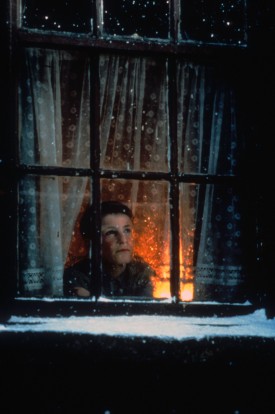‘The Long Day Closes’ is a beautiful tapestry from director Terence Davies

The Long Day Closes, director Terence Davies’s deeply personal account of his coming-of-age in Liverpool, is the closest cinematic equivalent to watching a multitude of paintings come to life. There is no story, except life itself. We watch Bud (Leigh McCormack) play with his friends, talk to his mother (Marjorie Yates) and find comforting solace in the local movie theater. It’s the 1950s, with many influences hanging heavy over the little boy’s life.
The film, which runs 85 minutes and is currently running in a new 35mm-restoration at New York City’s Film Forum, doesn’t concern itself with a linear plot line or character arcs. We descend upon Bud’s story and watch as the young boy tries to capture life by its horns. Davies presents this story-less story in a multitude of touching images that seem to bleed into each other. There probably has never been a movie that so expertly uses its transitions to such intimate effect. Characters walk inside and outside, as if there were no walls in 1955 Liverpool. This almost dizzying effect creates a wondrous fluidity and movement to the film, as if Bud and company are too busy for formalities.
The music and sound of the film are exquisite. Davies has many well-known tunes play over the portraits of family life — reminding us of the time period and also showing Bud’s fascination with the silver screen. This 11-year-old boy lives his life with a soundtrack constantly spooling, whether it’s Nat King Cole’s “Twilight Time” or Debbie Reynolds singing the strangely transfixing “Tammy”.
Like many films attempting to recreate the 1950s, there are sequences involving the church, the school and the home. Bud jumps from one location to another, always trying to keep his head above the water. His elementary school is strict and violent, a place where teachers begin the class by whacking the boys on the hand with a cane. His local church plays with the young, impressionable mind of the boy, and the crucifixion enraptures (and scares) him. His home life, with the nurturing love of his mother, provides Bud the greatest stability.

But The Long Day Closes is not about any individual scene or performance; the movie gathers its strength by the connective tissue that keeps everything together. Although I hesitate to use the word music video, there are similarities. Many scenes feature no dialogue and not much happening, at least in terms of typical cinematic storytelling. All we are left with are the soundtrack and these images of a boy and his life. To call these transitions a montage would be wrong. Time doesn’t seem to exist within these sequences; although there’s a sense of movement, there’s not much progression. Bud begins his day and ends it in the same fashion: wanting to make friends at school, fearing the guilt-laden architecture at the church and wishing he had more time (and pennies) for the local cinema.
Davies has created a modern masterpiece that reinvents the way a story can be told on the silver screen. It simultaneously works as an exploration of a boy’s life and a fanciful tribute to the wonder of moviemaking. It leaves a lasting impression and provides as much comforting warmth as a well-used quilt.
By John Soltes / Publisher / John@HollywoodSoapbox.com
-
The Long Day Closes
-
1992
-
Written and directed by Terence Davies
-
Starring Leigh McCormack, Marjorie Yates and Tina Malone
-
Running time: 85 minutes
-
Currently playing at the Film Forum in New York City. Click here for more information.
-
Rating:





